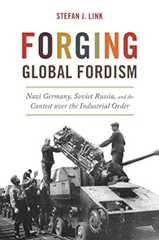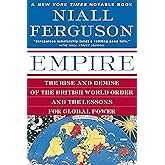
Download the free Kindle app and start reading Kindle books instantly on your smartphone, tablet, or computer -no Kindle device required.
Read instantly on your browser with Kindle for Web.
Using your mobile phone camera - scan the code below and download the Kindle app.

Forging Global Fordism: Nazi Germany, Soviet Russia, and the Contest over the Industrial Order (America in the World) Hardcover – September 29, 2020
Purchase options and add-ons
A new global history of Fordism from the Great Depression to the postwar era
As the United States rose to ascendancy in the first decades of the twentieth century, observers abroad associated American economic power most directly with its burgeoning automobile industry. In the 1930s, in a bid to emulate and challenge America, engineers from across the world flocked to Detroit. Chief among them were Nazi and Soviet specialists who sought to study, copy, and sometimes steal the techniques of American automotive mass production, or Fordism.Forging Global Fordism traces how Germany and the Soviet Union embraced Fordism amid widespread economic crisis and ideological turmoil. This incisive book recovers the crucial role of activist states in global industrial transformations and reconceives the global thirties as an era of intense competitive development, providing a new genealogy of the postwar industrial order.
Stefan Link uncovers the forgotten origins of Fordism in Midwestern populism, and shows how Henry Ford's antiliberal vision of society appealed to both the Soviet and Nazi regimes. He explores how they positioned themselves as America's antagonists in reaction to growing American hegemony and seismic shifts in the global economy during the interwar years, and shows how Detroit visitors like William Werner, Ferdinand Porsche, and Stepan Dybets helped spread versions of Fordism abroad and mobilize them in total war.
Forging Global Fordism challenges the notion that global mass production was a product of post–World War II liberal internationalism, demonstrating how it first began in the global thirties, and how the spread of Fordism had a distinctly illiberal trajectory.
- Print length328 pages
- LanguageEnglish
- PublisherPrinceton University Press
- Publication dateSeptember 29, 2020
- Dimensions6.5 x 1.25 x 9.5 inches
- ISBN-100691177546
- ISBN-13978-0691177540
Discover the latest buzz-worthy books, from mysteries and romance to humor and nonfiction.Explore more
Frequently purchased items with fast delivery
Customers also bought or read
- Total Defense: The New Deal and the Invention of National SecurityHardcover$29.95DeliveryMon, Nov 10
- Panic at the Pump: The Energy Crisis and the Transformation of American Politics in the 1970sPaperback$16.23DeliveryWed, Nov 12
- King of the North: Martin Luther King Jr.’s Life of Struggle Outside the SouthHardcover$21.85DeliveryMon, Nov 10
- Continental Reckoning: The American West in the Age of Expansion (History of the American West)Hardcover$26.17DeliveryMon, Nov 10
- G-Man (Pulitzer Prize Winner): J. Edgar Hoover and the Making of the American CenturyPaperback$13.76DeliveryTue, Nov 11
- The Rise and Fall of the Second American Republic: Reconstruction, 1860-1920Hardcover$17.95DeliveryTue, Nov 11
- Chicago's New Negroes: Modernity, the Great Migration, and Black Urban LifePaperback$37.50DeliveryWed, Nov 12
- The Arsenal of Democracy: FDR, Detroit, and an Epic Quest to Arm an America at WarPaperback$10.99DeliveryTue, Nov 11
- To Run the World: The Kremlin's Cold War Bid for Global Power#1 Best SellerPolitical HistoryHardcover$32.50DeliveryTue, Nov 11
- 1929: Inside the Greatest Crash in Wall Street History--and How It Shattered a Nation#1 Best SellerEconomic HistoryHardcover$29.40DeliveryTue, Nov 11
- The Allure of Battle: A History of How Wars Have Been Won and LostPaperback$19.16DeliveryMon, Nov 10
- Paper Soldiers: How the Weaponization of the Dollar Changed the World OrderHardcover$11.57DeliveryTue, Nov 11
- Red Globalization: The Political Economy of the Soviet Cold War from Stalin to Khrushchev (New Studies in European History)Paperback$29.37DeliveryWed, Nov 12
- Dark Skies: Space Expansionism, Planetary Geopolitics, and the Ends of HumanityPaperback$32.99DeliveryWed, Nov 12
- The Deluge: The Great War, America and the Remaking of the Global Order, 1916-1931Paperback$19.32DeliveryTue, Nov 11
- American Covenant: How the Constitution Unified Our Nation―and Could AgainHardcover$17.71DeliveryMon, Nov 10
- World on the Brink: How America Can Beat China in the Race for the Twenty-First CenturyHardcover$14.55DeliveryTue, Nov 11
Editorial Reviews
Review
"Honorable Mention for the Michael H. Hunt Prize in International History, Society for Historians of American Foreign Relations"
"Winner of the Herbert Baxter Adams Prize, American Historical Association"
"Link gives a fresh analysis of an overlooked dimension of interwar history, tracing the singular influence of Ford’s innovations and ideas upon the final, cataclysmic stages of twentieth-century industrialization.Forging Global Fordismallows us to better explore the relationship between industrialism, political ideology, and global competition, while also shedding important light on our tumultuous present moment."---Justin H. Vassallo,Boston Review
"[A] rich and nuanced industrial and ideological history, path-breaking in the way it both interrogates the meaning of Fordism as it emerged in the US and then was adopted and adapted in Germany and the Soviet Union between the 1920s and the end of the Second World War."---Nelson Lichenstein,H-Diplo Roundtable
"An ambitious and original study. . . .Forging Global Fordism challenges received wisdom about the history of globalization and the nature of the Nazi and Soviet economies."---Mary Nolan,Journal of Modern History
"An engaging and provocative global history of Fordism, focusing in particular on the Nazi and Soviet auto industries. . . . This is a rich book on an important topic. It is both deeply researched, drawing extensively on Russian, German, and American archives (as well as British and Italian ones) and engagingly written, giving due attention to particulars while consistently keeping an eye on the larger picture."---Mark A. Soderstrom,World History Connected
"Stefan J. Link has prepared a fast-paced and well-documented comparative account of a phenomenon he calls ‘global Fordism,’ and which he uses to analyze . . . the ‘global thirties.’"---Harold James,American Historical Review
Review
"Link's beautifully written book illustrates the competitive race toward Fordist mass production in surprisingly disparate political and economic regimes across the world.Forging Global Fordism is an indispensable and lucid contribution to our understanding of the global 1930s and the importance of the interwar years in shaping the postwar order."—Vanessa Ogle, author ofThe Global Transformation of Time: 1870–1950
"Forging Global Fordism offers a reinterpretation of the history of Fordism by recovering the origins of mass production in the American Midwest and examining the role of Henry Ford's illiberal visions of political economy during the global 1930s. Link combines perspectives from economic and global history in a fresh and convincing way."—Kiran Klaus Patel, author ofThe New Deal: A Global History
"Forging Global Fordism presents a global history of the 1930s centered not on Wall Street, FDR, Tokyo, or even Hitler, but on Henry Ford. Viewed from Detroit, that rueful decade imparts one surprising lesson after another."—Oscar Sanchez-Sibony, author ofRed Globalization: The Political Economy of the Soviet Cold War from Stalin to Khrushchev
"Forging Global Fordism is an exciting foray into the entangled histories of automobile production in the United States, Soviet Russia, and Nazi Germany. Writing with both passion and wit, Link addresses some of the most perennial and difficult historical questions about the relationship between politics and economics."—Lewis H. Siegelbaum, author ofCars for Comrades: The Life of the Soviet Automobile
About the Author
Product details
- Publisher : Princeton University Press
- Publication date : September 29, 2020
- Language : English
- Print length : 328 pages
- ISBN-10 : 0691177546
- ISBN-13 : 978-0691177540
- Item Weight : 2.31 pounds
- Dimensions : 6.5 x 1.25 x 9.5 inches
- Part of series : America in the World
- Best Sellers Rank: #814,105 in Books (See Top 100 in Books)
- #468 inGerman History (Books)
- #517 inEconomic History (Books)
- #1,898 inWorld War II History (Books)
- Customer Reviews:
Customer reviews
Customer Reviews, including Product Star Ratings help customers to learn more about the product and decide whether it is the right product for them.
To calculate the overall star rating and percentage breakdown by star, we don’t use a simple average. Instead, our system considers things like how recent a review is and if the reviewer bought the item on Amazon. It also analyzed reviews to verify trustworthiness.
Learn more how customers reviews work on AmazonTop reviews from the United States
There was a problem filtering reviews. Please reload the page.
- Reviewed in the United States on February 1, 2021Format: KindleVerified PurchaseThis book is an astounding achievement. It is meticulously researched and a pleasure to read. It is impeccably organized—the author's concern for the reader is obvious, with any difficult information reiterated and rephrased until it is perfectly clear. Both the larger historical narrative and the specific details are presented with remarkable lucidity, ensuring that the book will be a pleasure for all readers, even those less familiar with the historical details.
The stage is set with a fascinating discussion on how Henry Ford and his books were interpreted through different ideological lenses: communist and fascist. Then using Ford Motor as the example, the book explains in detail how the Soviet Union and Germany used Fordist methods to dramatically modernize their industries. This modernization through emulating Ford (and the Rouge plant in particular) was then applied to war production. After the war, industries revamped by the swift wartime introduction of flow assembly evolved into successful peacetime operations.
The book illustrates how the 1930s and WWII were not a break with 20th century development, but part of a continuity related to how Fordist methods were compatible with the illiberal trends and war production that characterized that period. In certain respects, this period is more of a fulcrum than a break, as the book shows.
If you are interested in how exactly an agrarian country like Russia underwent such extensive industrialization in the 1930s, or how exactly German industry was revamped in preparation for war, this book is highly illuminating. It explains the technology transfers and exchanges of experts that made this possible in both the Soviet and Nazi contexts. This is an especially strong point of the book: whereas a great deal of historical literature refers to the swift industrialization of the Soviet Union and the modernization of Germany in the 1930s, few provide the extensive practical detail found in Forging Global Fordism. The book illustrates that ideological bravado can only take a country so far; in the end, countries aspiring to modernization ultimately are forced to replicate the methods and machinery of the very countries they seek to surpass, despite revolutionary messaging suggesting replacement, overturning, or burying.
And the book is full of interesting information. For example, I was surprised to learn that Henry Ford essentially had an "open door policy" regarding the company's methods and engineering. He apparently did not believe in patents, and made all of Ford's blueprints freely available. This alone was very helpful to technology transfer, but beyond that, an agreement with the Soviet Union led to them having their own office located in Ford itself for many years prior to WWII. And when the Germans visited Ford's Rouge plant in 1937, they were welcome to take photographs and as much information back to Germany as they saw fit. Across the board, visitors reported how welcome they felt, and how helpful Ford engineers were. This openness is related back to Henry Ford's original theories on how industry should serve the common good, and how its primary function was to produce, to be useful, rather than to be exclusively for profits. This view is contrasted, for example, by General Motors which is shown to be more of a profit-making tool of bankers rather than a direct extension of the shop floor.
In all cases, detailed and enlivening portraits of the specific individuals powering these transformations are also provided: who they were, their family backgrounds and education, their personalities, their career arcs. The book perfectly balances these fascinating individual stories with the larger trends they were part of.
It would be very easy to make this review far too long, as Forging Global Fordism was so packed with interesting information within an excellently constructed narrative. Rather, I have recommended the book to many others, hoping that when they are finished I will be able to talk about it with them, as I enjoyed the book so much. I am confident others will feel the same. - Reviewed in the United States on December 26, 2022Format: HardcoverVerified PurchaseI thought it was a interesting book. It tells of the development of the industrial concept of “flow production” at Ford’s Highland Park auto factory and especially the River Rouge mega-factory to produce automobiles en mass and cheaply. “Flow production” is described conceptually in detail and in practice at River Rouge and compared to the historic prior batch production techniques. It then goes into detail on how Germany and the USSR attempted to copy the River Rouge design for their respective auto works for the Volkswagen and the GAZ factory in Nizhni Novgorod / Gorky. The book provides much detail on the personalities involved and on the manufacturing and management techniques. There are also interesting discussions on how the local national business or economic cultures found it difficult to emulate the American management and labor methods and systems.
The book goes into great detail on Soviet efforts to buy American production machinery and production technologies as part of their Five Year industrialization plans. There are also descriptions of the application of the flow production technique to airplane engine and aircraft production in Germany and to the production of tanks in the USSR.












































